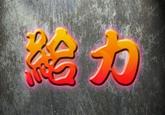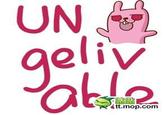| Navigation |
| About • Origin • Context and New Slang • Ungelivable and Très Guélile • Insight • Chinese Media Coverage • 给力 on TV • Complementary Resources • Recent Images |
About
给力 (pronounced "Gĕi Lì" in English, literally meaning "Give Power") is a Chinese buzzword and Internet slang that can mean "cool", "awesome," or even "exciting" in its adjective form. It can also be used as a verb, as in "to attribute coolness." The slang has become so popular among Chinese netizens that it has gotten press coverage throughtout the world, and has been validated as a new piece of slang by Chinese officials. Notably, English and French translations have also been made for both its affirmative and negative forms.
It is also used among players in Defense of the Ancients when they see a good item, and want to "acquire its power."
Origin
On May 8, 2010, Youku user GoodOldArsenal uploaded a video entitled 优酷二传】搞笑漫画日和之《西游记:旅程的终点》(中文配音)(cucn201出品. Its original upload has received more than 1,500,000 views on Youku.com, although there have been multiple mirrors uploaded to other video-sharing websites, making the total viewcount difficult to determine.
The video is a fandub of an episode from the Japanese anime Gag Manga Biyori. Here is a Youtube version from it, uploaded Junet 19, 2010:
The anime itself consists of about parodies of short stories mainly involving Japanese mythos. The episode the meme comes from is the 10th from the first season, know as "Saiyūki: The end of the journey" (Saiyūuki: tabi no owari – 西遊記 〜旅の終わり〜) and first aired in 2005. What would strike viewers is a peculiar line in the fandub : 不给力 (Pinyin: Bù Gĕi Lì; Literally: "Not Give Power").

The original Japanese dub is shown below (with English subtitles):
Context and New Slang
The fandubs are produced by a group of students calling themselves CUCN201 who are from the Communication University of China’ Nanjing. They are well-known for their fandubs mixed between respect of the original text and usage of modern words and jokes, an example being this video, another case of of their work, and which has gathered more than 4 700 000 views. 不给力 (Bu Gei Li) gained instant appeal because of its use in the dialogue (extract from it) :
悟空:这就是天竺么?不给力啊老湿!
Translation : “This is India? It does not gei li, teacher.”
(Full Dialogue can be read here)
Prior to the video, 给力 was already being used in Chinese vernacular to mean "give power to, do right by or do justice to."
According to the Baidu.com article about the Gei Li phenomenon, the use of 不给力 ("Not Cool") was first popularized by CUCN201's fandub. However, both its negative and affirmative forms as 不给力 ("Not Cool") and 给力 ("Cool") respectively were popularized during the 2010 World Cup in South Africa as a way to cheer or mock on the Chinese team.
- Chinese article from July 2010 showing that use of Gei Li's popularity. [Work in Progress]
Ungelivable and Très Guélile

On November 5, 2010, around the same time the slang was exploding on the Chinese web, a Chinese netizen named 欧阳天 decided to translate it to the foreign world in English on a microblog (the post now seems to have been deleted), and the phrases, ungelivable for 不给力 and gelivable for 给力, went viral:

Later, netizens coined Très guélile (very guélile) as a way to express 给力 in French.
This action has been covered by many articles, including the New York Times in November and Shanghai's magazine The Global Times in December :
– French article about the phenomenon.
– China Mobide.
– Women of China
– Hubpages.com
– Chinese article on ungelivable.
In November the 8th 2010, ungelivable even reached Urban Dictionary.
Insight
Chinese Media Coverage
On November 10 2010, 给力 was featured in a headline on the front page of the People's Daily, the main party's newspaper in China :

The fact that Chinese netizens were excited that serious government officials would adopt modern internet slang is reflected in an article by Women of China :
Used in a sense that means "to empower", which differs slightly from the netizen nuance (see below), readers were nonetheless delighted at the appearance of this up-to-the-minute term in the country's main Party newspaper. The power of the Internet is thus indisputable.
给力 on TV
On December 28 2010, the 给力 = gelivable phenomenon appeared on Chinese 总编辑时间 (Phoenix TV) :
Earlier that month, Chinese Boy band Top Combine composed a song entitled Gelivable youth 给力青春. The following video is the music clip they made for it.
They also sang it during Hunan TV's New Year Concert :
Complementary Resources
Recent Videos
There are no videos currently available.














Comments ( 9 )
Sorry, but you must activate your account to post a comment.
Please check your email for your activation code.